
College English Creative Reading 3 跨文化交际英语·阅读教程3 Unit 9 English Words 上海外语教育出版社 外数¥杜SHANGHAI FOREIGN LANGUAGE EDUCATION PRESS
College English Creative Reading 3 跨文化交际英语 · 阅读教程3 Unit 9 English Words
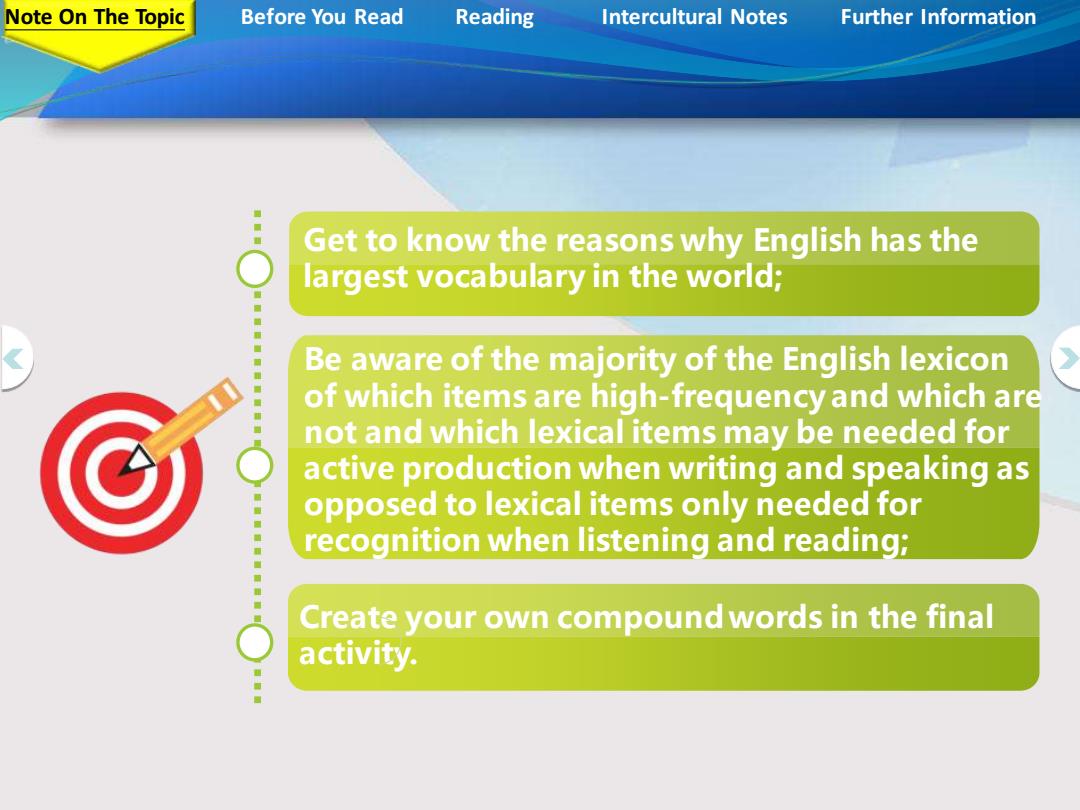
Note On The Topic Before You Read Reading Intercultural Notes Further Information Get to know the reasons why English has the largest vocabulary in the world; Be aware of the majority of the English lexicon of which items are high-frequency and which are not and which lexical items may be needed for active production when writing and speaking as opposed to lexical items only needed for recognition when listening and reading; Create your own compound words in the final activity
Before You Read Reading Intercultural Notes Further Information Get to know the reasons why English has the largest vocabulary in the world; Create your own compound words in the final activity. Note On The Topic Be aware of the majority of the English lexicon of which items are high-frequency and which are not and which lexical items may be needed for active production when writing and speaking as opposed to lexical items only needed for recognition when listening and reading;
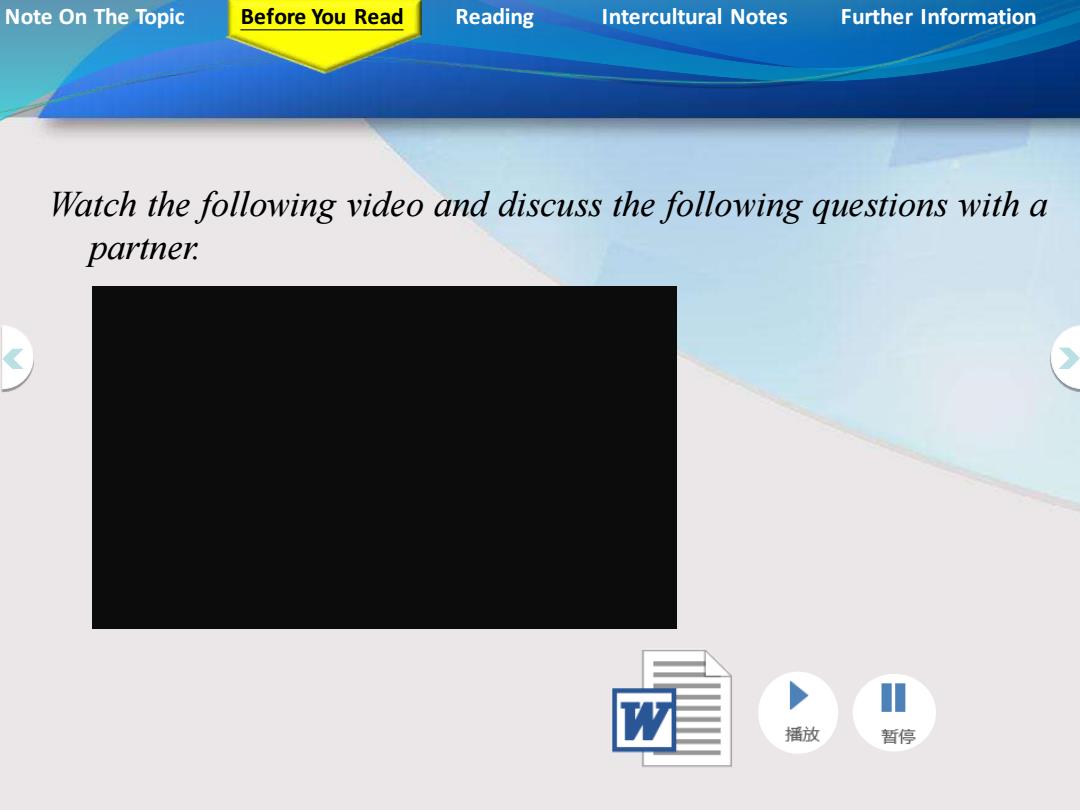
Note On The Topic Before You Read Reading Intercultural Notes Further Information Watch the following video and discuss the following questions with a partner 小 播放 暂停
Watch the following video and discuss the following questions with a partner. Note On The Topic Before You Read Reading Intercultural Notes Further Information

Note On The Topic Before You Read Reading Intercultural Notes Further Information 1.In the year 400 C.E.,the Celts in Britain were ruled by Romans. This had one benefit for the Celts,what is it? The Romans protected them from the barbarian Saxon tribes of Northern Europe. 2.How long was French the language of the British royalty? French was the language of the British royalty for three centuries. 3.When Norman king was at English throne,society in Britain came to have two levels,what were they? They are French-speaking aristocracy and Old English-speaking peasants
1. In the year 400 C.E., the Celts in Britain were ruled by Romans. This had one benefit for the Celts, what is it? 2. How long was French the language of the British royalty? 3. When Norman king was at English throne, society in Britain came to have two levels, what were they? The Romans protected them from the barbarian Saxon tribes of Northern Europe. They are French-speaking aristocracy and Old English-speaking peasants. French was the language of the British royalty for three centuries. Note On The Topic Before You Read Reading Intercultural Notes Further Information

Note On The Topic Before You Read Reading Intercultural Notes Further Information 4.As the language expanded,what did English speakers realize if they wanted to sound sophisticated?And why? They would use words that had come from French or Latin. Because Anglo Saxon words seemed so plain like the Anglo Saxon peasants who spoke them. 5.What's the speaker's purpose of offering the scenes and questions at the very beginning? She wants to tell us that whether we realize it consciously or only subconsciously,our history lives in the words we speak and hear
4. As the language expanded, what did English speakers realize if they wanted to sound sophisticated? And why? 5. What’s the speaker’s purpose of offering the scenes and questions at the very beginning? They would use words that had come from French or Latin. Because Anglo Saxon words seemed so plain like the Anglo Saxon peasants who spoke them. She wants to tell us that whether we realize it consciously or only subconsciously, our history lives in the words we speak and hear. Note On The Topic Before You Read Reading Intercultural Notes Further Information

Note On The Topic Before You Read Reading Intercultural Notes Further Information Lead-in Questions: 1.What language is the most popular in the world?Why? English,of course.The reasons are as follows: a)Most important international language; b) Easy to communicate with foreign people,academic conferences,etc.; c)Good for people to look for jobs; d) Basic requirement for the Web language; 2.Which countries regard English as the mother tongue? Britain,U.S.A.,Canada,Australia,New Zealand,Ireland, South Africa
Lead-in Questions: 1. What language is the most popular in the world? Why? 2. Which countries regard English as the mother tongue? English, of course. The reasons are as follows: a) Most important international language; b) Easy to communicate with foreign people, academic conferences, etc.; c) Good for people to look for jobs; d) Basic requirement for the Web language; Britain, U.S.A., Canada, Australia, New Zealand, Ireland, South Africa. Note On The Topic Before You Read Reading Intercultural Notes Further Information
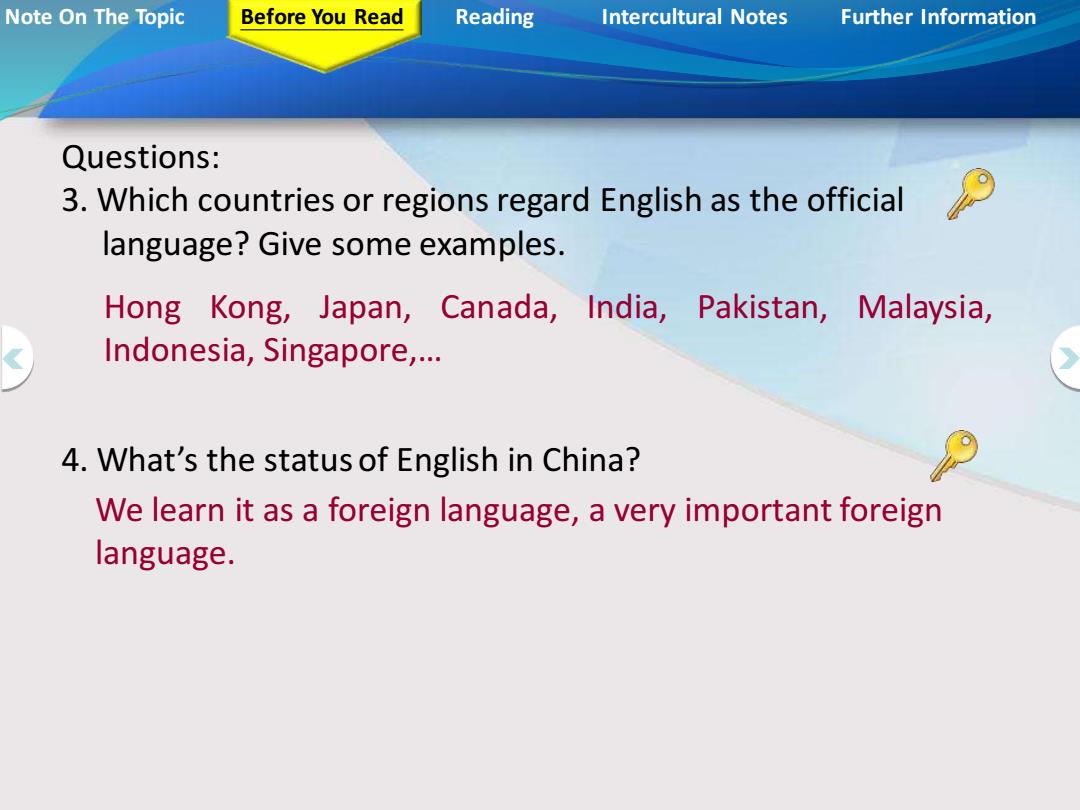
Note On The Topic Before You Read Reading Intercultural Notes Further Information Questions: 3.Which countries or regions regard English as the official language?Give some examples. Hong Kong,Japan,Canada,India,Pakistan,Malaysia, Indonesia,Singapore,... 4.What's the status of English in China? We learn it as a foreign language,a very important foreign language
Questions: 3. Which countries or regions regard English as the official language? Give some examples. 4. What’s the status of English in China? Hong Kong, Japan, Canada, India, Pakistan, Malaysia, Indonesia, Singapore,… We learn it as a foreign language, a very important foreign language. Note On The Topic Before You Read Reading Intercultural Notes Further Information
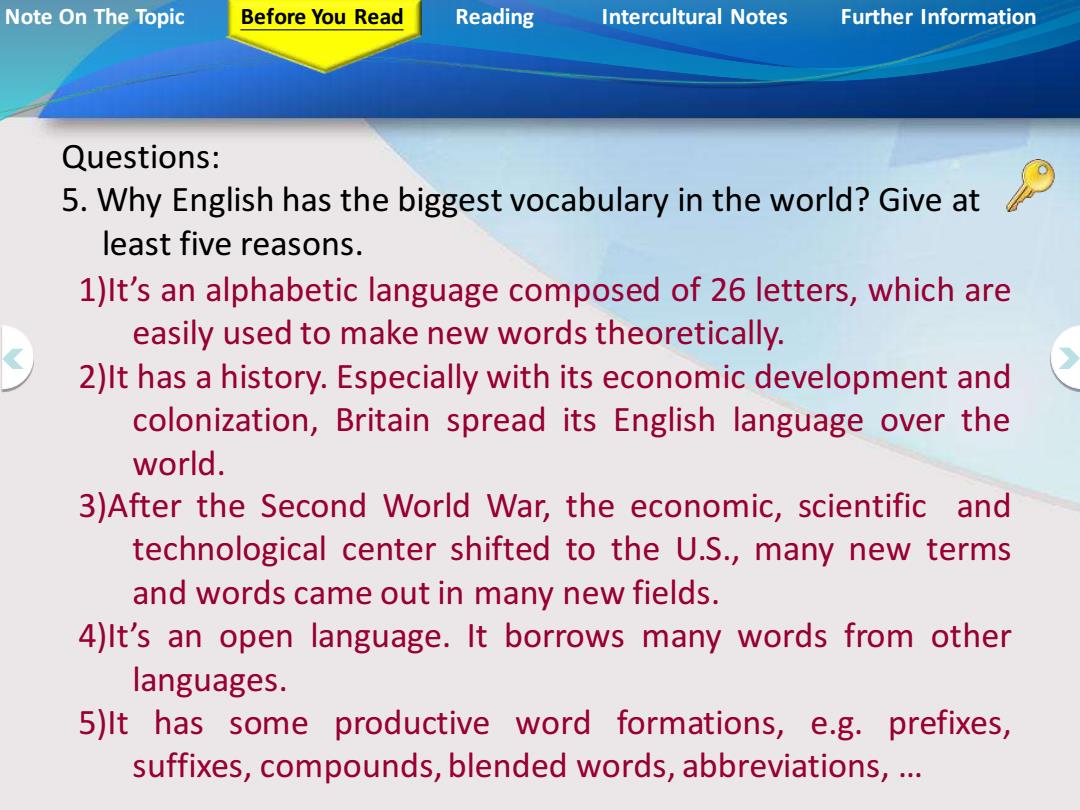
Note On The Topic Before You Read Reading Intercultural Notes Further Information Questions: 5.Why English has the biggest vocabulary in the world?Give at least five reasons. 1)It's an alphabetic language composed of 26 letters,which are easily used to make new words theoretically. 2)It has a history.Especially with its economic development and colonization,Britain spread its English language over the world. 3)After the Second World War,the economic,scientific and technological center shifted to the U.S.,many new terms and words came out in many new fields. 4)It's an open language.It borrows many words from other languages. 5)It has some productive word formations,e.g.prefixes, suffixes,compounds,blended words,abbreviations
Questions: 5. Why English has the biggest vocabulary in the world? Give at least five reasons. 1)It’s an alphabetic language composed of 26 letters, which are easily used to make new words theoretically. 2)It has a history. Especially with its economic development and colonization, Britain spread its English language over the world. 3)After the Second World War, the economic, scientific and technological center shifted to the U.S., many new terms and words came out in many new fields. 4)It’s an open language. It borrows many words from other languages. 5)It has some productive word formations, e.g. prefixes, suffixes, compounds, blended words, abbreviations, … Note On The Topic Before You Read Reading Intercultural Notes Further Information
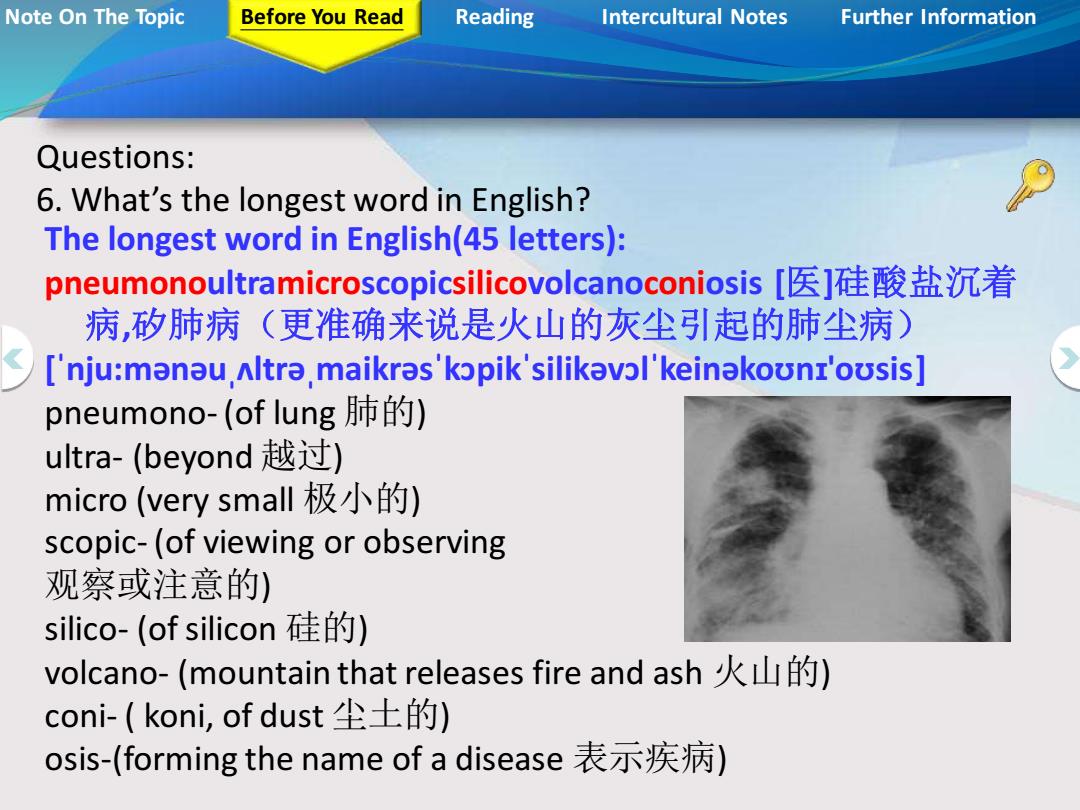
Note On The Topic Before You Read Reading Intercultural Notes Further Information Questions: 6.What's the longest word in English? The longest word in English(45 letters): pneumonoultramicroscopicsilicovolcanoconiosis[医]硅酸盐沉着 病,矽肺病(更准确来说是火山的灰尘引起的肺尘病) ['nju:manau,Altra,maikras'kopik'silikevol'keinakounr'ousis] pneumono-(of lung肺的) ultra-(beyond越过) micro(very small极小的) scopic-(of viewing or observing 观察或注意的) silico-(of silicon硅的) volcano-(mountain that releases fire and ash火山的) coni-(koni,of dust尘土的) osis-(forming the name of a disease表示疾病)
Questions: 6. What’s the longest word in English? The longest word in English(45 letters): pneumonoultramicroscopicsilicovolcanoconiosis [医]硅酸盐沉着 病,矽肺病(更准确来说是火山的灰尘引起的肺尘病) [ˈnju:mənəuˌʌltrəˌmaikrəsˈkɔpikˈsilikəvɔlˈkeinəkoʊnɪ'oʊsis] pneumono- (of lung 肺的) ultra- (beyond 越过) micro (very small 极小的) scopic- (of viewing or observing 观察或注意的) silico- (of silicon 硅的) volcano- (mountain that releases fire and ash 火山的) coni- ( koni, of dust 尘土的) osis-(forming the name of a disease 表示疾病) Note On The Topic Before You Read Reading Intercultural Notes Further Information

Note On The Topic Before You Read Reading Intercultural Notes Further Information Questions: 6.Other longer words in English? Antidisestablishmentarianism 元多
Questions: 6. Other longer words in English? Note On The Topic Before You Read Reading Intercultural Notes Further Information